شرق وجنوب أفريقيا
تواصلوا مع الفريق
All news and events
نتائج 201 من 220 – 368
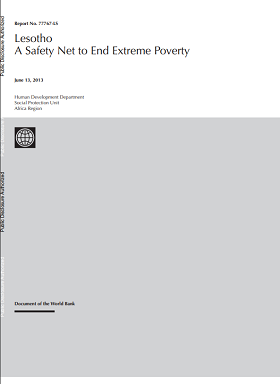
Lesotho: A Safety Net to End Extreme Poverty
Report
The objective of this study is to help the government to decide what role safety net and transfer programs should play in the coming 5 to 10 years. It seeks to answer three questions: Can increased spending on transfers accelerate poverty reduction in the medium to long term? Which groups and aspects of...

Scoping study – Emergency cash transfer programming in the WaSH and shelter sectors
Report
Over the past few years, the dialogue on cash transfer programming has progressed beyond initial debates about whether distributing cash and vouchers is a valid response modality at all to a general acceptance of their added value in appropriate contexts. Beyond the livelihoods and food...

Lesotho Child Grants Programme – The historic and future costs of the CGP and its affordability
Report
The purpose of this costing study is to review the historical costs of the Child Grants Programme (CGP) between October 2007 and December 2012, simulate the likely future cost of the programme, and assess the programme’s affordability under the current fiscal environment. This report presents the...
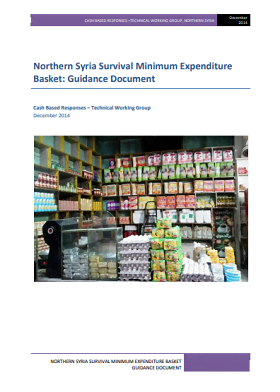
Northern Syria Survival Minimum Expenditure Basket: Guidance Document
Report
The Survival Minimum Expenditure Basket (SMEB) outlines the minimum culturally-adjusted items for survival for a household in Syria for one month. The basket comprises the basic energy requirements of 2,100 kilocalories per person per day, fuel for cooking, and non-food items. The attached guide has been...
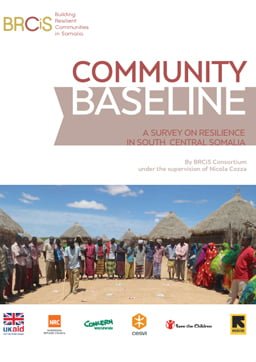
Community Baseline: A Survey On Resilience In South Central Somalia
Report
A comprehensive understanding of the socio-economic and environmental context of intervention is essential to the success of any resilience-building program. Based on this premise, the BRCiS has taken a series of steps to strengthen its knowledge and understanding of key variables and dynamics in its...
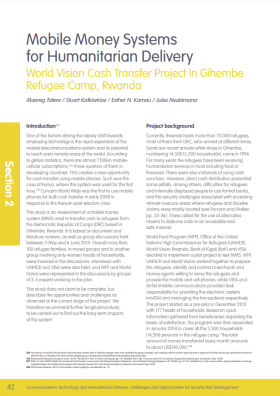
Mobile Money Systems for Humanitarian Delivery: World Vision cash transfer project in Gihembe refugee camp, Rwanda
Report
One of the factors driving the steady shift towards employing technology is the rapid expansion of the mobile telecommunications system and its potential to reach even remote areas of the world. According to global statistics, there are almost 7 billion mobilecellular subscriptions, three-quarters of them...
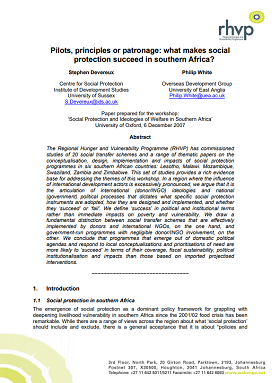
Pilots, principles or patronage: what makes social protection succeed in southern Africa?
Report
The Regional Hunger and Vulnerability Programme (RHVP) has commissioned studies of 20 social transfer schemes and a range of thematic papers on the conceptualisation, design, implementation and impacts of social protection programmes in six southern African countries: Lesotho, Malawi....
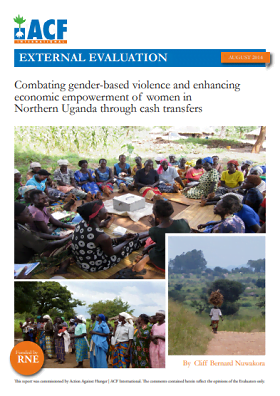
Combating gender-based violence and enhancing economic empowerment of women in Northern Uganda through cash transfers
Report
The aim of this evaluation is to assess the relevance, sustainability, effectiveness and efficiency of the programme. Moreover, the evaluation will assess the impact of the programme on women and girls in relation to livelihoods and economic empowerment and access to social services, including education,...

Community Baseline: A Survey On Resilience In South Central Somalia Summary
Report
A comprehensive understanding of the socio-economic and environmental context of intervention is essential to the success of any resilience-building program. Based on this premise, the BRCiS has taken a series of steps to strengthen its knowledge and understanding of key variables and dynamics in its...
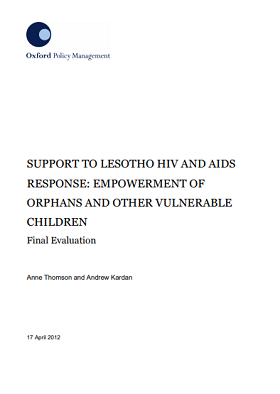
Support to Lesotho HIV and AIDs Response: Empowerment of Orphans and Other Vulnerable Children
Report
Oxford Policy Management (OPM) has been contracted by UNICEF Lesotho to undertake the final evaluation of the Project “Support to Lesotho HIV and AIDS Response: Empowerment of Orphans and Vulnerable Children”. The main objective of this evaluation is to provide decision makers in the Government of...
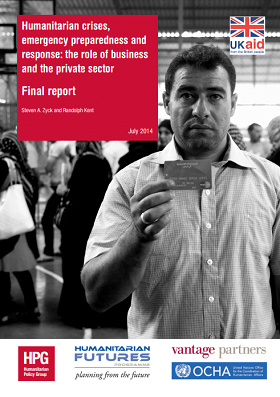
Humanitarian crises, emergency preparedness and response: The roles of business and the private sector – final report and case studies from Indonesia, Kenya, Jordan and Haiti
Report
The private sector has long been a major contributor to humanitarian action. At the community level, businesses frequently use their materials and resources to aid people affected by crises. As local markets recover and supply chains are repaired, crisis-affected people are once again able to access basic...
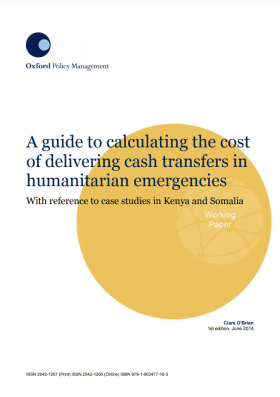
A Guide to Calculating the Cost of Delivering Cash Transfers in Humanitarian Emergencies – With reference to case studies in Kenya and Somalia
Report
The emergence of cash transfers as a viable alternative to in-kind aid – such as food or shelter materials – for households affected by humanitarian disasters has been documented for some years now. Under certain conditions, when local markets are able to accommodate increased demand and prices will...
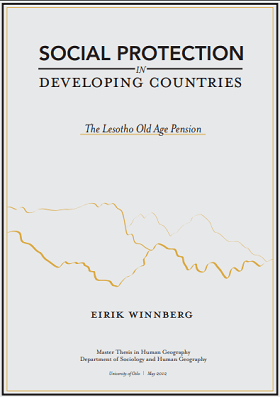
Social protection in developing countries – The Lesotho Old Age Pension (MSc Thesis)
Report
By using the example of the noncontributory pension scheme in Lesotho, the author explores the process of implementing social protection in developing countries, looking at how constraints can be overcome and what consequences can be found. This paper also looks at the justification for directing such...
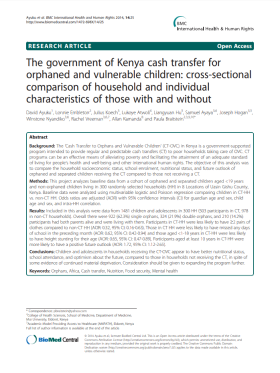
The Government of Kenya Cash Transfer for Orphaned and Vulnerable Children: Cross-sectional Comparison of Household and Individual Characteristics of Those With and Without
Report
The ‘Cash Transfer to Orphans and Vulnerable Children’ (CT-OVC) in Kenya is a government-supported program intended to provide regular and predictable cash transfers (CT) to poor households taking care of OVC. CT programs can be an effective means of alleviating poverty and facilitating the attainment...
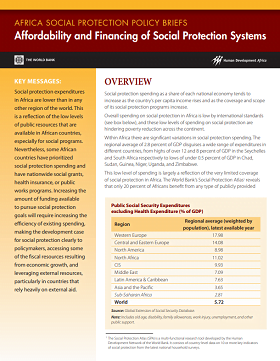
Africa Social Protection Policy Briefs – Affordability and Financing of Social Protection Systems
Report
Social protection spending as a share of each national economy tends to increase as the country’s per capita income rises and as the coverage and scope of its social protection programs increase. Overall spending on social protection in Africa is low by international standards (see box below), and these...
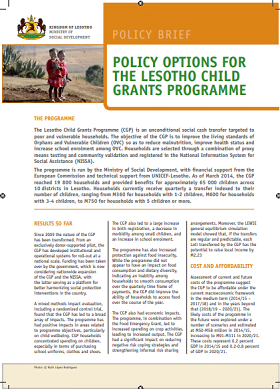
Policy brief – Policy options for the Lesotho Child Grants Programme
Policy paper
The Lesotho Child Grants Programme (CGP) is an unconditional social cash transfer targeted to poor and vulnerable households. The objective of the CGP is to improve the living standards of Orphans and Vulnerable Children (OVC) so as to reduce malnutrition, improve health status and increase school...

Cash Transfers and HIV Prevention
Report
This paper proposes some initial principles on how to optimize HIV impacts of cash transfers, by encouraging targeting that: focuses on communities with high rates of new HIV infections, particularly acquired via sexual transmission; reduces local or community levels of economic inequalities between men...
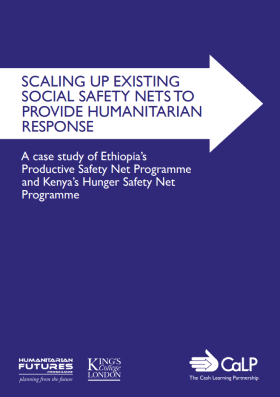
Scaling Up Existing Social Safety Nets to Provide Humanitarian Response: A case study of Ethiopia’s Productive Safety Net Programme and Kenya’s Hunger Safety Net Programme
Policy paper
A case study of Ethiopia’s Productive Safety Net Programme and Kenya’s Hunger Safety Net Programme. This thematic report has been undertaken as part of a 2013 research study entitled, Is Cash Transfer Programming ‘Fit for the Future’? The research was commissioned by the the CALP Network and...
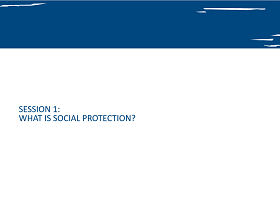
What is social protection?
Report
This presentation was made on behalf of UNICEF at the social protection framework validation meeting that took place at the Jacaranda Hotel in Nairobi, Kenya on 26 September 2014. It looks at components and dimensions of social protection, lessons from global experiences and some limitations of the...

Factors Affecting the Cost-efficiency of Electronic Transfers in Humanitarian Programmes
Report
Led by Oxford Policy Management (OPM) with support from Concern Worldwide, this research aims to answer the key question: Are electronic transfers more cost-efficient than traditional manual based cash delivery methods, and under what conditions? Cash is increasingly offered to households in...




